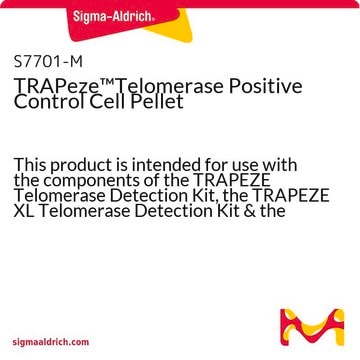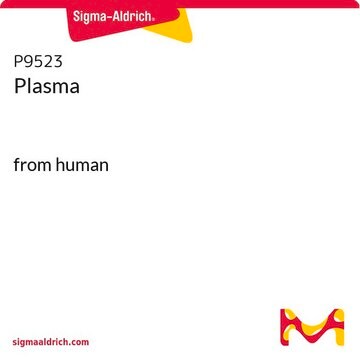S7710
TRAPeze™ RT-Telomerase-Detektionskit
A highly sensitive in vitro assay for the fluorometric detection & real time quantification of telomerase activity in cells.
Synonym(e):
TRAP Assay
Anmeldenzur Ansicht organisationsspezifischer und vertraglich vereinbarter Preise
Alle Fotos(1)
About This Item
UNSPSC-Code:
12161503
eCl@ss:
32161000
NACRES:
NA.32
Empfohlene Produkte
Qualitätsniveau
Hersteller/Markenname
Chemicon®
TRAPeze™
Anwendung(en)
genomic analysis
Versandbedingung
dry ice
Allgemeine Beschreibung
Das TRAPeze™ RT-Telomerase-Detektionskit ist ein In-vitro-Assay mit hoher Sensitivität für den fluorometrischen Nachweis und die Echtzeitquantifizierung der Telomeraseaktivität. Mit diesem Kit wurde der ursprüngliche TRAPeze™ Assay optimiert und um die Fähigkeit zur Quantifizierung der Telomeraseaktivität mittels Fluoreszenz-Energietransfer(ET)-Primern erweitert.
Telomeres are specific structures found at the end of chromosomes in eukaryotes. In human chromosomes, the telomeres consist of thousands of copies of 6 base repeats (TTAGGG)(1-3). It has been suggested that telomeres protect chromosome ends since damaged chromosomes lacking telomeres undergo fusion, rearrangement and translocation (2). In somatic cells, telomere length is progressively shortened with each cell division both in vivo and in vitro (4-7) due to the inability of the DNA polymerase complex to synthesize the very 5′ end of the lagging strand (8,9).
Telomerase is a ribonucleoprotein that synthesizes and directs the telomeric repeats onto the 3′ end of existing telomeres using its RNA component as a template (10-14). Telomerase activity has been shown to be specifically expressed in immortal cells, cancer and germ cells (15,16) where it compensates for telomere shortening during DNA replication and thus stabilizes telomere length (7,17). These observations have led to a hypothesis that telomere length may function as a "mitotic clock" to sense the number of cell divisions and eventually signal replicative senescence or programmed cell death when a critical telomere length is achieved. Therefore, expression of telomerase activity in cancer cells may be a necessary and essential step for tumor development and progression (16,18-20). The causal relationship between expression of telomerase and telomere length stabilization and the extension of the life span of the human cell has recently been reported (21).
The development of a sensitive and efficient PCR-based telomerase activity detection method, TRAP (Telomeric Repeat Amplification Protocol) (15, 22), has made possible large scale surveys of telomerase activity in human cells and tissues (15, 23-29). To date, telomerase activity has been detected in over 85% of all tumors tested spanning more than 20 different types of cancers (30-31).
The TRAPeze™ RT Telomerase Detection Kit is a highly sensitive in vitro assay for the fluorometric detection and real time quantification of telomerase activity. It incorporates refinements to the original TRAP assay that were first introduced in the gel-based TRAPeze™ Telomerase Detection Kit (Cat. No. S7700) and adds the ability to quantitate telomerase activity using fluorescence energy transfer (ET) primers similar to the TRAPeze™ XL Telomerase Detection Kit (Cat. No. S7707). As in the original TRAPeze™ Kit, primer sequence modifications that reduce amplification artifacts and PCR controls for standard curve generation are included. In addition, both the TRAPeze™ RT and XL Kits use fluorescence energy transfer (ET) primers to generate fluorescently labeled TRAP products which permit nonisotopic, quantitative analysis of telomerase activity.
The unique design of these ET primers (Amplifluor® primers) allows detection and quantification of telomerase activity by directly measuring real time fluorescence emission in the reaction vessels. Since Amplifluor® primers will fluoresce only upon incorporation into the TRAP products, post-PCR sample manipulations such as electrophoretic gel or ELISA analyses are eliminated, thereby reducing the the risk of carry-over contamination. Quantitative analysis is not compromised when detection is performed in a high-throughput 96-well format unlike platforms utilizing a qualitative ELISA. Additionaly, an additional stand alone control is provided separately to assess PCR inhibitors that may be present in experimental samples. (Please see product insert for references).
Telomerase is a ribonucleoprotein that synthesizes and directs the telomeric repeats onto the 3′ end of existing telomeres using its RNA component as a template (10-14). Telomerase activity has been shown to be specifically expressed in immortal cells, cancer and germ cells (15,16) where it compensates for telomere shortening during DNA replication and thus stabilizes telomere length (7,17). These observations have led to a hypothesis that telomere length may function as a "mitotic clock" to sense the number of cell divisions and eventually signal replicative senescence or programmed cell death when a critical telomere length is achieved. Therefore, expression of telomerase activity in cancer cells may be a necessary and essential step for tumor development and progression (16,18-20). The causal relationship between expression of telomerase and telomere length stabilization and the extension of the life span of the human cell has recently been reported (21).
The development of a sensitive and efficient PCR-based telomerase activity detection method, TRAP (Telomeric Repeat Amplification Protocol) (15, 22), has made possible large scale surveys of telomerase activity in human cells and tissues (15, 23-29). To date, telomerase activity has been detected in over 85% of all tumors tested spanning more than 20 different types of cancers (30-31).
The TRAPeze™ RT Telomerase Detection Kit is a highly sensitive in vitro assay for the fluorometric detection and real time quantification of telomerase activity. It incorporates refinements to the original TRAP assay that were first introduced in the gel-based TRAPeze™ Telomerase Detection Kit (Cat. No. S7700) and adds the ability to quantitate telomerase activity using fluorescence energy transfer (ET) primers similar to the TRAPeze™ XL Telomerase Detection Kit (Cat. No. S7707). As in the original TRAPeze™ Kit, primer sequence modifications that reduce amplification artifacts and PCR controls for standard curve generation are included. In addition, both the TRAPeze™ RT and XL Kits use fluorescence energy transfer (ET) primers to generate fluorescently labeled TRAP products which permit nonisotopic, quantitative analysis of telomerase activity.
The unique design of these ET primers (Amplifluor® primers) allows detection and quantification of telomerase activity by directly measuring real time fluorescence emission in the reaction vessels. Since Amplifluor® primers will fluoresce only upon incorporation into the TRAP products, post-PCR sample manipulations such as electrophoretic gel or ELISA analyses are eliminated, thereby reducing the the risk of carry-over contamination. Quantitative analysis is not compromised when detection is performed in a high-throughput 96-well format unlike platforms utilizing a qualitative ELISA. Additionaly, an additional stand alone control is provided separately to assess PCR inhibitors that may be present in experimental samples. (Please see product insert for references).
Verpackung
Das Kit beinhaltet ausreichend Reagenzien für 224 TRAPeze™ RT-Reaktionen.
Komponenten
CHAPS Lysepuffer (13,5 ml)
5X TRAPeze™ RT-Reaktionsmischung (1,12 ml)
5X TRAPeze™ Kontroll-Reaktionsmischung (1,12 ml)
Wasser in PCR-Qualität (8,2 ml)
TSR8* (Template zur Quantifizierungskontrolle (45 μl)
TSK* (PCR-Hemmungs-/Neutralisierungskontrolle (45 μl)
Kontroll-Zellpellet (Telomerase-positive Zellen; 106 Zellen)
* Vorsicht – siehe Absch. II. Kitkomponenten, Vorsichtshinweise in der Produktbeilage.
5X TRAPeze™ RT-Reaktionsmischung (1,12 ml)
5X TRAPeze™ Kontroll-Reaktionsmischung (1,12 ml)
Wasser in PCR-Qualität (8,2 ml)
TSR8* (Template zur Quantifizierungskontrolle (45 μl)
TSK* (PCR-Hemmungs-/Neutralisierungskontrolle (45 μl)
Kontroll-Zellpellet (Telomerase-positive Zellen; 106 Zellen)
* Vorsicht – siehe Absch. II. Kitkomponenten, Vorsichtshinweise in der Produktbeilage.
Lagerung und Haltbarkeit
1. CHAPS Lysepuffer – 15 °C bis -25 °C
2. 5X TRAPeze™ RT-Reaktionsmischung -15 °C bis -25 °C
3. 5X TRAPeze™ Kontroll-Reaktionsmischung 2 °C bis 8 °C
4. Wasser in PCR-Qualität – 15 °C bis -25 °C
5. TSR8 -15 °C bis -25° C
6. TSK -15 °C bis -25 °C
7. Kontroll-Zellpellet -75 °C bis -85 °C
2. 5X TRAPeze™ RT-Reaktionsmischung -15 °C bis -25 °C
3. 5X TRAPeze™ Kontroll-Reaktionsmischung 2 °C bis 8 °C
4. Wasser in PCR-Qualität – 15 °C bis -25 °C
5. TSR8 -15 °C bis -25° C
6. TSK -15 °C bis -25 °C
7. Kontroll-Zellpellet -75 °C bis -85 °C
Rechtliche Hinweise
ABI PRISM is a registered trademark of Applera Corporation or its subsidiaries in the US and/or certain other countries
Amplifluor is a registered trademark of Merck KGaA, Darmstadt, Germany
CHEMICON is a registered trademark of Merck KGaA, Darmstadt, Germany
Opticon is a trademark of Bio-Rad Laboratories, Inc.
TRAPEZE is a trademark of Merck KGaA, Darmstadt, Germany
iCycler is a registered trademark of Bio-Rad
Signalwort
Warning
H-Sätze
P-Sätze
Gefahreneinstufungen
Aquatic Chronic 3 - Met. Corr. 1
Lagerklassenschlüssel
8B - Non-combustible corrosive hazardous materials
Flammpunkt (°F)
Not applicable
Flammpunkt (°C)
Not applicable
Analysenzertifikate (COA)
Suchen Sie nach Analysenzertifikate (COA), indem Sie die Lot-/Chargennummer des Produkts eingeben. Lot- und Chargennummern sind auf dem Produktetikett hinter den Wörtern ‘Lot’ oder ‘Batch’ (Lot oder Charge) zu finden.
Besitzen Sie dieses Produkt bereits?
In der Dokumentenbibliothek finden Sie die Dokumentation zu den Produkten, die Sie kürzlich erworben haben.
Kunden haben sich ebenfalls angesehen
Sylwia Kabacik et al.
Aging, 10(10), 2800-2815 (2018-10-18)
The paramount role of senescent cells in ageing has prompted suggestions that re-expression of telomerase may prevent ageing; a proposition that is predicated on the assumption that senescent cells are the sole cause of ageing. Recently, several DNA methylation-based age
Stanley T Parish et al.
Journal of immunology (Baltimore, Md. : 1950), 182(7), 4237-4243 (2009-03-21)
Expanded populations of CD8(+) T lymphocytes lacking CD28 expression are associated with a variety of deleterious clinical outcomes, including early mortality in the elderly, more rapid progression to AIDS, cardiovascular disease, and enhanced tumor cell growth. In cell culture, irreversible
Dimitrios Baltzis et al.
Experimental and therapeutic medicine, 15(4), 3420-3424 (2018-04-05)
Telomerase is the enzyme that maintains telomere length by adding telomeric repeats after each cell division. Numerous metabolic factors such as obesity, insulin resistance or physical inactivity have been associated with shortened telomeres. In the present study, we assessed telomerase
Estrogen and telomerase in human peripheral blood mononuclear cells.
Ann L Benko,Nancy J Olsen,William J Kovacs
Molecular and cellular endocrinology null
Rita Maria Laura La Rovere et al.
Frontiers in aging neuroscience, 6, 90-90 (2014-05-27)
The skeletal fibers have different embryological origin; the extraocular and jaw-closer muscles develop from prechordal mesoderm while the limb and trunk muscles from somites. These different origins characterize also the adult muscle stem cells, known as satellite cells (SCs) and
Unser Team von Wissenschaftlern verfügt über Erfahrung in allen Forschungsbereichen einschließlich Life Science, Materialwissenschaften, chemischer Synthese, Chromatographie, Analytik und vielen mehr..
Setzen Sie sich mit dem technischen Dienst in Verbindung.











